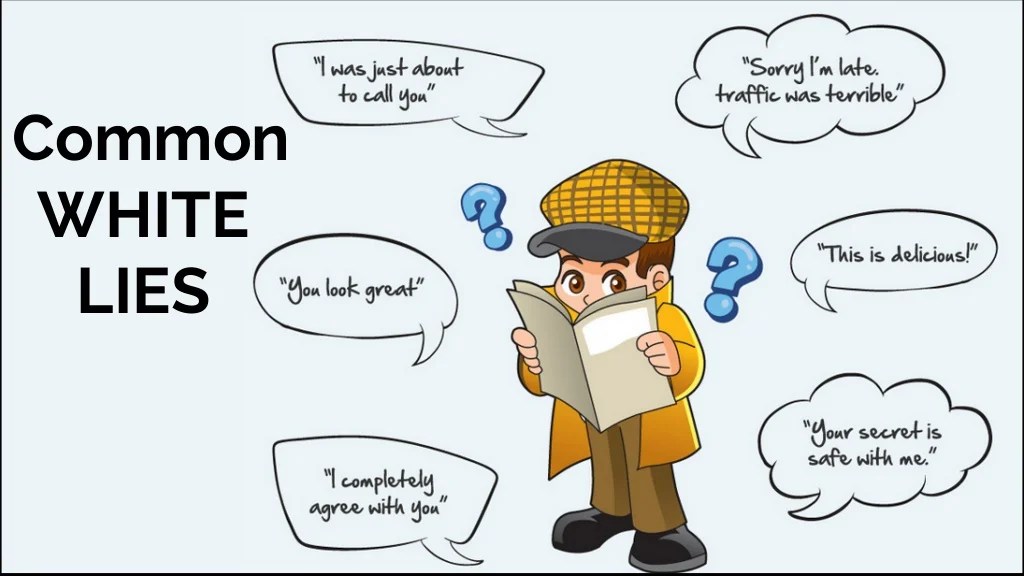Exploring The World Of Good White Lies
In a world where honesty is often celebrated as the ultimate virtue, the concept of "good white lies" invites us to rethink our understanding of truthfulness. These small untruths, often told with the best of intentions, serve various purposes in our social interactions, ranging from preserving feelings to maintaining harmony. As we delve into the intricacies of good white lies, we discover their role in our daily lives and the ethical dilemmas they sometimes present. Could these seemingly harmless exaggerations or omissions serve as a necessary social lubricant? Or do they risk undermining the very foundation of trust in our relationships?
From telling a friend that their new haircut looks great, even if it doesn't, to assuring a child that their drawing is a masterpiece, good white lies are abundant in everyday life. They often stem from a desire to protect others from unnecessary hurt or to avoid awkward situations. Yet, the question remains: when does a good white lie cross the line into dishonesty? This exploration will guide us through various scenarios where good white lies are employed and the impact they have on our interpersonal dynamics.
Understanding the psychology behind these minor deceptions can reveal much about human nature and our need for social connection. As we navigate through the complexities of good white lies, we will begin to appreciate their role in fostering empathy and kindness, while also recognizing the potential pitfalls that accompany them. So, let us embark on this journey to uncover the truth behind good white lies and their significance in our lives.
What Are Good White Lies?
Good white lies are often considered harmless and are typically told to avoid hurting someone's feelings or to maintain social harmony. Unlike malicious lies, which are intended to deceive for personal gain, good white lies are shared with altruistic intentions. They are often seen as a form of social lubrication, enabling smoother interactions among friends, family, and even strangers.
When Do Good White Lies Become Harmful?
While good white lies are often benign, there are instances where they can lead to complications. For example, if someone consistently tells white lies to avoid confrontation, it might create a pattern of dishonesty that undermines trust in the relationship. Similarly, a well-intentioned lie about someone's abilities or performance might prevent them from addressing real issues they need to improve. Here are some scenarios that illustrate when good white lies might be harmful:
- When they prevent necessary feedback or growth.
- If they become a habitual way to avoid difficult conversations.
- When the truth eventually surfaces, leading to greater hurt.
Can Good White Lies Improve Relationships?
Yes, good white lies can enhance relationships by fostering kindness and empathy. For example, a simple compliment can boost someone's confidence and strengthen bonds. However, it's essential to strike a balance. Here are a few ways good white lies can positively impact relationships:
- Encouraging positivity in social interactions.
- Helping to avoid unnecessary conflict.
- Providing emotional support during difficult times.
Are There Cultural Differences in Perceptions of Good White Lies?
Indeed, cultural context plays a significant role in how good white lies are perceived. In some cultures, direct honesty is valued above all, while in others, maintaining harmony and face-saving through white lies is prevalent. Understanding these differences is crucial, especially in our increasingly globalized world. Here are some cultural perspectives on good white lies:
- In collectivist cultures, where group harmony is prioritized, white lies may be more accepted.
- In individualistic cultures, direct communication may be encouraged, making good white lies less common.
What Are Some Common Examples of Good White Lies?
Good white lies can manifest in various scenarios, often tailored to the context and the individuals involved. Here are several common examples:
- Telling a friend that their cooking is delicious, even if it was just okay.
- Assuring someone that their outfit looks great, regardless of personal opinion.
- Expressing excitement over a gift that may not have been well-received.
How to Navigate Good White Lies in Everyday Life?
Navigating the use of good white lies requires a thoughtful approach. Here are a few tips to consider:
- Assess the potential impact of your words on the other person.
- Consider whether the white lie serves a positive purpose.
- Be prepared to offer constructive feedback when necessary.
Conclusion: The Fine Line of Good White Lies
In conclusion, good white lies can serve an essential role in our social interactions, fostering kindness and empathy while maintaining harmony. However, it's crucial to be mindful of the potential consequences they may carry. Striking the right balance between honesty and compassion will ultimately lead to healthier relationships. By understanding the dynamics of good white lies, we can navigate our social landscapes with greater awareness and intention.
Discovering Unique Wolf Names Male: A Guide To Naming Your Fierce Companion
Unveiling The Age Of Ivanita Lomeli: A Journey Through Time
Discovering The Life Of Evelyn Taft's Husband: A Journey Of Love And Partnership


